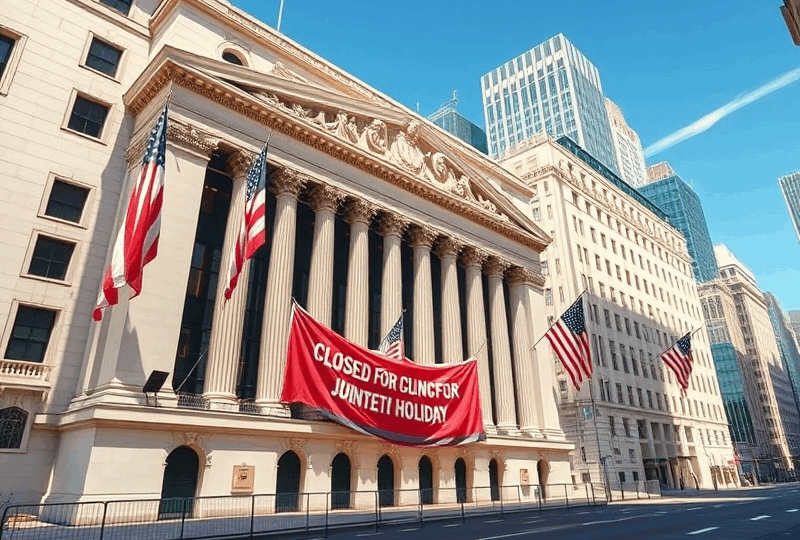
Is the Stock Market Closed on Juneteenth? What U.S. Investors Should Know

Understanding Juneteenth and Its Recognition in Financial Markets
Juneteenth, officially recognized as a federal holiday in the United States since June 17, 2021, commemorates the emancipation of enslaved African Americans. As of 2025, it is observed annually on June 19. While many federal institutions close in observance, how does this affect U.S. financial markets? The answer is more nuanced than a simple yes or no.
According to the New York Stock Exchange (NYSE) and NASDAQ, both markets have been closed on Juneteenth since 2022. This move aligns with broader corporate and governmental efforts to recognize the historical significance of the holiday. However, other financial institutions such as banks and brokerage firms may operate on modified schedules, creating inconsistencies for investors.
Why the Market Closure Matters to Investors
Market closures impact more than just trading activity—they influence liquidity, volatility, and portfolio management. For instance, traders who rely on short-term strategies must adjust their timelines, while long-term investors may need to recalibrate automatic investment plans or dividend reinvestments.
Consider the case of an options trader who had positions expiring on June 19, 2023. With the markets closed, the expiration was pushed to the next trading day, affecting both valuation and risk exposure. According to data from the Chicago Board Options Exchange (CBOE), open interest on certain contracts spiked the following day, leading to higher-than-average volatility.
Comparative Table: U.S. Market Closures on Federal Holidays (2025)
| Holiday | Date | NYSE/NASDAQ | Bond Market |
|---|---|---|---|
| New Year’s Day | Jan 1 | Closed | Closed |
| Juneteenth | Jun 19 | Closed | Early Close (2 PM) |
| Independence Day | Jul 4 | Closed | Closed |
| Thanksgiving | Nov 27 | Closed | Closed |
| Christmas | Dec 25 | Closed | Closed |
Expert Insight: How Professionals Prepare for Juneteenth
According to Karen Firestone, CEO of Aureus Asset Management, “Market closures like Juneteenth require us to adjust our weekly trading models. We front-load activity to ensure clients’ needs are met without disruption.” This proactive approach is echoed by many institutional investors who now integrate Juneteenth into their annual trading calendars.
Additionally, Fidelity Investments released a 2024 client memo advising retail investors to review automatic transfers and retirement contributions scheduled around federal holidays. This kind of preparation helps avoid delays in fund settlements or missed investment opportunities.
Scenario Analysis: What If You Trade Internationally?
For U.S. investors with international exposure, Juneteenth presents a unique challenge. While U.S. markets are closed, global exchanges like the London Stock Exchange or Tokyo Stock Exchange remain open. This can lead to price discrepancies and arbitrage opportunities—but also increased risk.
For example, in 2023, the S&P 500 ETF (SPY) showed a 0.6% gap-up on June 20, the day after Juneteenth, partially attributed to movements in European and Asian markets during the U.S. closure. Traders using global macro strategies need to monitor these cross-market dynamics closely.
Personal Perspective: My Experience Navigating Juneteenth Closures
As a U.S.-based investor, I initially underestimated the impact of Juneteenth when it was first observed in financial markets. In 2022, I had a limit order set to execute on June 19, only to realize too late that the market was closed. Since then, I’ve incorporated holiday calendars into my portfolio management software and set alerts a week in advance.
For those using platforms like Schwab or E*TRADE, I recommend syncing your brokerage calendar with your Google or iCal to avoid similar issues. Small steps like these can prevent missed trades or unnecessary confusion.
Final Thoughts: Planning Ahead for Market Holidays
Juneteenth is now firmly part of the U.S. financial calendar. As investors, adapting to this change means more than acknowledging a day off—it involves adjusting strategies, timelines, and expectations. Whether you’re a day trader or a long-term investor, being proactive can help you navigate market closures with confidence.
For the most accurate and updated information, always refer to official sources like the NYSE Holiday Calendar or your brokerage’s service updates.
Disclaimer
This article is for informational purposes only and does not constitute financial advice. Please consult a licensed financial advisor or tax professional before making investment decisions. Market schedules are subject to change and should be verified with official sources.
Author
Written by: James M. Carter, CFA
Financial Blogger & Portfolio Strategist
Based in Austin, TX, James has over 12 years of experience in equity research and investment strategy. He writes about market trends, behavioral finance, and retirement planning.







